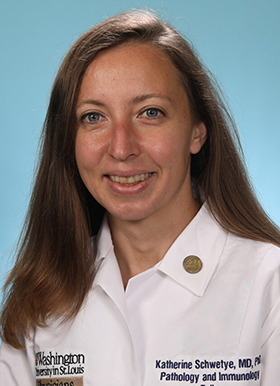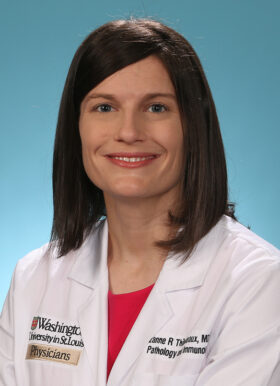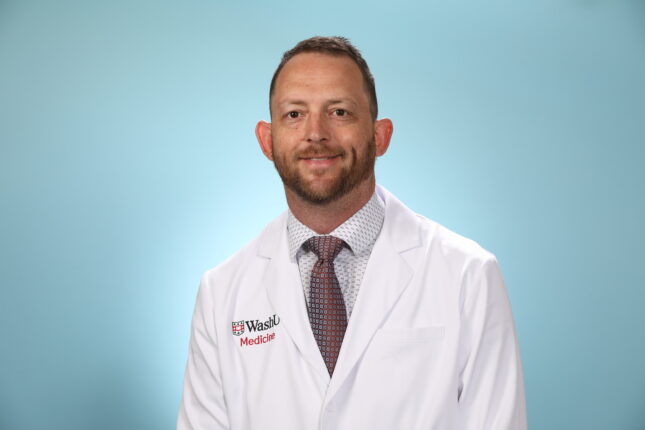Letter from our Program Directors
Thank you for your interest in pathology and lab medicine training at WashU Medicine!
Trainees at our institution have the opportunity to work in world-class facilities while learning from renowned experts in a variety of disciplines. This allows them to establish a strong foundation of knowledge across all fields of pathology and laboratory medicine. This also gives them in-depth exposure they need to make informed decisions about their future career. As such, our trainees have gone on to successful careers in a variety of anatomic and clinical pathology disciplines in both academic and private practice settings.
Barnes-Jewish Hospital is an approximately 1,300-bed facility serving a wide variety of local and nationally referred patients, including patients at the Alvin J. Siteman Cancer Center. Our academic campus is shared with St. Louis Children’s Hospital, serving approximately 300,000 children a year. Both the hospitals and the cancer center are consistently ranked as top institutions in the country by US News & World Report, attracting patients with complex medical issues requiring multidisciplinary laboratory services. This creates the ideal setting for those looking for a wide-ranging exposure to interesting adult and pediatric clinical scenarios.
Cutting edge clinical and research opportunities
Whether you’re interested in molecular approaches to malignancies, histologic diagnosis of common and rare diseases, novel solutions for the diagnosis of infectious diseases, management of complex transfusion-related issues, challenging interpretation of clinical chemistry results, or the use of informatics to address clinical problems, the breadth and depth of our clinical learning environment can accommodate these diverse interests. Our wealth of learning opportunities allows our residents to thoroughly explore varied interests – some of which they may not have even known they had!
For those looking to be involved with cutting edge research, the opportunities are equally broad. They range from translational research into quality improvement initiatives and new diagnostics all the way to basic science endeavors such as studying the interactions between disease and the immune system or the human microbiome. Through these projects, many of our trainees have had the opportunity to publish their work in top tier academic journals and give presentations at national meetings. We view research pursuits as important components of residency training and, as such, are eager to provide the time and financial support needed to pursue them.
We pride ourselves on the ability to combine our clinical and research opportunities into a single well-rounded training experience. Our AP/CP residency is a four-year track of integrated exposure to anatomic and clinical pathology throughout all years of training. Residents are taught the basics of anatomic pathology and laboratory medicine through daily clinical experiences (including case sign out and laboratory rounds) as well as through organized didactics and workshops. During their training, all residents give formal presentations to their peers and faculty, interact with other medical disciplines, develop quality improvement projects and teach fellow trainees. For residents with more specific interests, AP-only, CP-only and AP-Neuropathology training tracks are available. Trainees interested in pursuing a career focused on scientific research are encouraged to apply to our Physician-Scientist Training Program (PSTP), which combines AP-only or CP-only training with basic science research in a way that can be tailored to an individual trainee’s interests.
Perhaps the greatest strength of our trainee program is the trainees themselves. Through regular trainee leadership committee and resident-fellow meetings, they drive constant program improvements. They mentor each other, support each other and together with our faculty, they form a diverse and welcoming community. While they are hard-working, it is not uncommon to find them together outside of work enjoying some of the fun activities offered by our great city. Be it family gatherings at Forest Park, hanging out at the Zoo, touring an art museum, competing at bar-trivia, or dining in one of our small eclectic neighborhoods, training in St. Louis is more than just “training”– it’s an enjoyable experience our residents share with one another and remember throughout their career.
We welcome you to read more about our training program, reach out to us if you have questions, and consider being a part of our Washington University Pathology and Laboratory Medicine family!
Sincerely,
Katherine Schwetye, MD, PhD
Residency Program Director
314-273-4873
schwetyk@wustl.edu
Suzanne Thibodeaux, MD, PhD
Associate Residency Program Director
314-273-1465
srthibodeaux@wustl.edu
Paul Buttars, DO
Associate Residency Program Director
314-273-7204
buttars@wustl.edu


